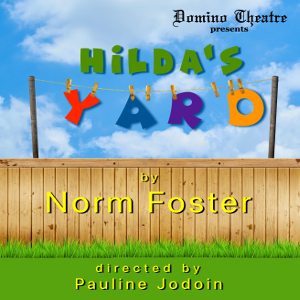A Family in Flux: ‘Hilda’s Yard’

At Hilda’s house, nobody uses the front door. Set in 1956, Hilda’s Yard follows an afternoon of mild chaos as empty nesters Hilda and Sam Fluck find their adult children hopping the fence in an unannounced—and uninvited—return home. Jokes are made, relatives are nagged, and heartfelt conversations are had. Hilda’s Yard, a comedy by Norm Foster, premiered in New Brunswick in 2012. This month, it appears at Kingston’s Domino Theatre in a production directed by Pauline Jodoin.
The program promises a “heart warming and relatable family comedy.” While “relatable” is relative—to me, the most relatable moment was when Sam was aghast at the rising cost of bread—this production delivers 1950s nostalgia by the bucketload. With a Rockwellian set, quaint costumes, and classic American pop tunes playing between scenes and at intermission, Hilda’s Yard is successful in creating a fantasy of a simpler time, and it seems to resonate strongly with Domino Theatre’s audience.
Starring real-life married couple Rae and Bryan McDonald as Hilda and Sam, Hilda’s Yard takes a generally feel-good stroll through complicated family dynamics. Rae McDonald is fantastic as Hilda, giving a performance that is at once snarky and loving. Her comic sensibilities come to life beautifully in Hilda’s over-the-fence monologues to her invisible neighbour, Mrs. Lindstrom. As Sam, Bryan McDonald is the quintessential well-meaning, out-of-touch sitcom dad, and he does great work with the character’s growing emotional range as the play progresses. The McDonalds make a strong leading couple with playful, comfortable chemistry.
Paul Butler and Mary Kennedy play siblings Gary and Janey, the Flucks’ grown-up kids who find themselves back home after some unexpected setbacks. Both actors do a tremendous job with characters that strike me as rather unsympathetically written. I enjoyed Butler’s portrayal of head-in-the-clouds hopeless romantic Gary. Hilda and Gary really feel like mother and son, and Butler offers some winning bashful smiles when he’s interrogated about his personal life. Meanwhile, Kennedy has the tough task of making the naive and seemingly helpless 30-year-old Janey likeable, and she succeeds. She brings warmth and honesty to the character, and when Janey and her father have a difficult conversation about her failing marriage, she shows a stronger side.
Regan Bennett is charming as Bobbi, Gary’s new girlfriend who looks and talks like she stepped straight out of Grease. While the amount of slang in her lines is at the level of parody, Bennett’s portrayal of a hip young woman meeting her boyfriend’s decidedly un-hip parents for the first time feels sincere. Playing another larger-than-life character, Kevin Shipley brings panache to the role of Beverly, the silver-tongued bookie who’s been chasing Gary for money. While I had a hard time believing that Beverly could be a menace to anyone, I enjoyed Shipley’s portrayal of this charismatic oddball.
While I mostly found the play funny, its sources of comedy weren’t always my cup of tea. The jokes are well-written and well-delivered, but some of the humour feels dated. Hilda’s astonishment that a man could be named Beverly and a woman could be named Bobbi, though expressed with satisfying alliteration—“You’ve got a bookie named Beverly and a bimbo named Bobbi?!”—felt more like a facepalm moment. Similarly, as a young adult on a less-than-traditional career path, I found Hilda’s barrage of questions for her children in Act I more grating than entertaining. I think this is partially a generational thing—“Gary, are you ever gonna get your life straightened out?” rings differently in my millennial ears than it may for older audience members who grew up in times of stricter norms and greater economic promise.
Although some of Hilda and Sam’s initial stances are challenged—the climax involves an exploration of how families react to learning about domestic violence—other topics, like post-traumatic stress, are brought up briefly and then fall by the wayside in favour of snappy one-liners. Overall, the play acknowledges how parents’ desire for their children to have security can cloud their perceptions of well-being. However, it makes very small-scale progress in coming to terms with change, even considering its time period. In the end, everything turns out peachy keen, and the nuclear family comes together for a toast. The Flucks’ little world may have expanded by a few millimetres (it’s a Canadian play, so I get to use the metric system), but nothing more.
If you like old sitcoms and enjoy listening to Doris Day, you’ll probably like Hilda’s Yard. Domino Theatre’s production runs until Sunday, May 13th.
To learn more about Domino Theatre’s production of Hilda’s Yard, click here.
This article was edited on December 1st, 2023 to update formatting.